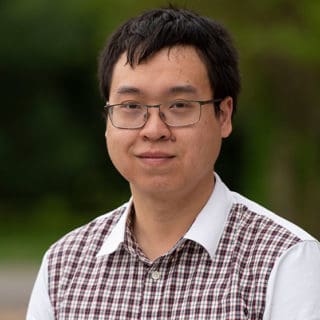“The goal of chemistry education is to prepare every student with adequate chemistry knowledge and skills to meet the needs of society. It will also ensure that chemistry will be loved by future generations of citizens. I employ a variety of traditional methods and modern technologies, and incorporate the history of chemistry into courses to make students the center of chemistry education.”
Title
Assistant Professor of Chemistry
Educational Background
- Ph.D., Texas A&M University – College Station, TX
- B.Sc., Wuhan University – Wuhan, China
Year Joined Franklin
2018
Expertise
Atmospheric chemistry; gas phase reaction dynamics and mechanism; kinetics; spectroscopy; building scientific apparatus; science/education related programming.
I am initially trained in college as a pure chemist, but received in-depth chemical physics training in the Ph.D. program. Such experiences grant me a number of skills which include but are not limited to: designing and using instruments to “see” molecules and their motions; and developing programs to “squeeze” chemistry information from experimental observations.
What is more important is that I realized the importance of interdisciplinary research. In the 21st century, traditional “pure chemistry,” “pure physics” or “pure biology” will be replaced by better collaborations of all three subjects. I am good at using physics and math as tools to solve chemistry problems, and I am enthusiastic about helping students acquire such skills.
Why do we need to learn math if we are a chemistry/biology/health major?
The ability to quantify a challenge and solve it with math is getting more and more important. For example, even in the late 20th century, with the help of statistics (and old room-sized computers), epidemiologists successfully pinpointed the cause of a severe disease which broke out during a veteran reunion, without examining all suspected causes one by one.
In my classes, I facilitate a math-friendly environment and help students to learn how to use math to solve chemistry problems, with a combination of practice worksheets, software-involved projects and inspiring stories.
What can I do with a chemistry degree?
There are so many things you can do with a chemistry degree. Check out this American Chemical Society page and you will likely find your dream career on the list.
You can do research in academia, industry or the military. You can serve in different jobs in industry and government institutes. You can be a doctor, a dentist, a forensic scientist or a patent lawyer. You can also do jobs that do not sound related to chemistry, but in reality are, like sales and Human Resources. You can even be a popular-science writer if you get a chemistry degree and a journalism/ literature-related degree.
I talked with a member of the National Academy of Sciences Council in the summer of 2018, and he emphasized that a science degree now has an even larger impact on the job hunting of American people.
Selected Professional Accomplishments
Selected Talks
“Reaction Dynamics Study of Carbonyl Sulfide 214nm Photodissociation”, American Physical Society National Meeting, San Antonio, TX, March (2015).
Selected Conferences
Gordon Research Conference, Stonehill College, Easton, MA, July 2016 and 2018.
63rd Pacific Conference on Spectroscopy and Dynamics, Pacific Grove, CA, January 2016.
American Physical Society National Meeting, San Antonio, TX, March 2015.
American Chemical Society Southwest Regional Meeting, Waco TX, November 2013.
Awards
A.E. Martell Travel Award, Texas A&M University, TX, 2016
Graduate Student Presentation Grant, Texas A&M University, TX, 2015
National Training Program of Innovation for Undergraduates, Ministry of Education, China, 2008-2010
Publications
Wei Wei, Colin J. Wallace, Michael P. Grubb and Simon W. North “A Method of Extracting Speed-dependent Vector Correlations from 2+1 REMPI Ion Images” J. Chem. Phys. 147, 013947 (2017) (Special Topic Invitation)
Wei Wei, Colin J. Wallace, George C. McBane, and Simon W. North “Photodissociation Dynamics of OCS Near 214 nm Using Ion Imaging”, J. Chem. Phys. 145, 024310 (2016)
My Favorite Movies
Drama: To Live
Romance: Gone with the Wind
Comedy: Forrest Gump
Action: Hero (2002 Chinese movie)
Historical: Kingdom of Heaven
Animation: Princess Mononoke
